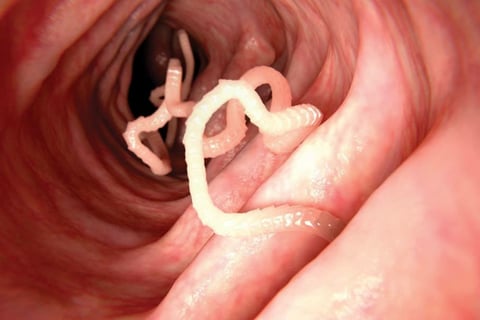5 Parasitic Infections You Didn't Know You Could Get (But Probably Have)
You may think parasitic infections are rare, but the reality is they're disturbingly common. In fact, millions of people around the world are unknowingly hosting these unwanted guests - and suffering the consequences. In this eye-opening blog post, we'll expose 5 of the most prevalent parasites that can infect the human body. From the notorious roundworm to the insidious giardia, you'll learn how these organisms are contracted, the symptoms they cause, and crucially, what you can do to prevent and treat these parasitic infections. Parasites may be small, but their impact can be huge - including long-term damage to your health, cognitive function, and quality of life. Get informed about these 5 sneaky parasites, so you can take steps to keep them out of your body for good. Arm yourself with the knowledge to avoid becoming an unsuspecting host.
4/15/20243 min read


Parasites are organisms that live and feed off a host, often causing harm or disease in the process.
Unfortunately, parasitic infections are more common than many people realize, with millions of people around the world playing host to these unwelcome guests.
In this post, we'll take a closer look at 5 of the most prevalent parasites that can infect the human body, including how they're contracted, the symptoms they cause, and ways to prevent and treat these infections.
5 Parasites That Could Be Secretly Living Inside You
ROUNDWORMS


Roundworms, also known as Ascaris lumbricoides, are one of the most widespread human parasites globally.
These large intestinal worms can grow up to 12 inches long and live for over a year inside their human host.
Roundworm infections typically occur from ingesting food or water contaminated with roundworm eggs.
Initial symptoms may include abdominal pain, nausea, and diarrhea.
In severe cases, a large number of worms can cause intestinal blockages.
Good hygiene, proper food preparation, and regular deworming HERBS are important for preventing and treating roundworm infections.
Tapeworms


Tapeworms are flat, segmented intestinal parasites that can reach several feet in length.
The most common tapeworm species that infect humans are the beef tapeworm and the pork tapeworm.
Tapeworm infections typically occur from ingesting undercooked meat containing tapeworm larvae.
Symptoms may include abdominal pain, diarrhea, weight loss, and in some cases, the visible passage of tapeworm segments.
Proper cooking of meat and good hygiene are key prevention methods.
Treatment generally involves taking herbs to eliminate the tapeworm.


Giardia lamblia
Giardia lamblia is a microscopic parasite that causes the diarrheal illness giardiasis.
It is one of the most common waterborne parasitic diseases worldwide.
Giardia is typically contracted by ingesting contaminated food or water.
Common symptoms include severe diarrhea, abdominal cramps, nausea, and fatigue.
In some cases, the infection can lead to malabsorption of nutrients.
Good hygiene, such as handwashing and avoiding untreated water, is important for prevention.
treatment with antiparasitic herbs is usually required to fully clear a Giardia infection.



Toxoplasma
Toxoplasma gondii is a single-celled parasite that can cause the disease toxoplasmosis.
It is estimated that up to 40% of the global population has been exposed to Toxoplasma.
The parasite is primarily spread through contact with cat feces or by eating undercooked meat containing Toxoplasma cysts.
Many people with Toxoplasma infections experience no symptoms, but it can cause flu-like illness, lymph node enlargement, and even damage to the eyes or brain in some cases.
Pregnant women and those with weakened immune systems are at higher risk of serious complications.
Proper hygiene and cooking meat thoroughly are key prevention methods.



pinworms
Pinworms, or Enterobius vermicularis, are small, white, thread-like worms that infect the lower intestine.
Pinworm infections, known as enterobiasis, are a common occurrence, especially in children.
They spread through the ingestion of pinworm eggs, often via contaminated food, surfaces, or from person-to-person contact.
Symptoms can include itching around the anus, disturbed sleep, and irritability.
Good hygiene practices like handwashing and keeping nails trimmed short can help prevent pinworm infections.
use anti-worm herbs


